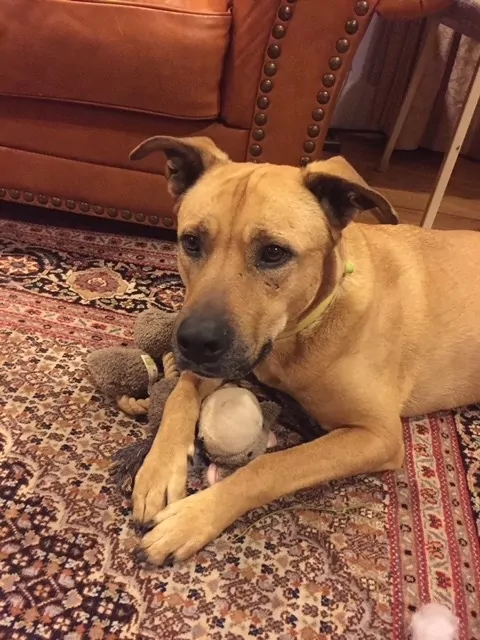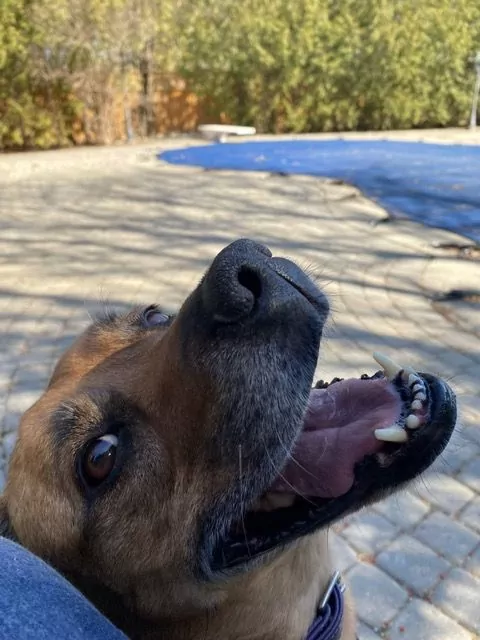Boxer-Shepherd mixes Dixie and Pixie were found behind a restaurant in the city and taken to a shelter. These sisters were estimated to be about ten months old but weren’t considered bonded enough to be adopted out together. Thus, Dixie went to my client, an active woman who loved fitness and being out with her dogs.
A few months later, my client got wind of the fact that Pixie was still at the shelter. She turned up with Dixie in tow only to lose her a few moments later, as Dixie had taken off to the kennel where she and Pixie had been, looking for her sister. It was clear to my client then that she had to keep the sisters together and so Pixie came home with them.
Adopting siblings isn’t normally considered a good idea, as sibs raised together can display dysfunctions commonly referred to as “littermate syndrome.” These issues are believed to occur because fraternal bonds hinder the formation of healthy connections with humans and deter the development of skills to deal in a human world. The siblings can be inseparable or they can be in an all-out war, sometimes requiring that one of be rehomed.
In her message to Way of Life Dog Training, my client explained that the sisters’ “prey drive is starting to become a huge problem.” The girls had issues, not with each other but with anything smaller including other dogs, cats, squirrels, raccoons, skunks, as well as little kids. My client said she found it nearly impossible to go anywhere with the girls and missed her days of being active with them. I came to find out later that the sisters had ganged up on a few neighborhood critters, with unfortunate consequences.
“I really need help,” my client said.
The problem with raising siblings is very much the same as raising dogs in a multi-dog household. The dogs do not need to be related for their fears of being apart to be dysfunctional, for their fights to be violent, or for the stress they feel from being codependent to manifest as reactivity and aggression.
As a society, we seem to think that dogs need each other when in fact they don’t. Of course, some dogs thrive on the company of other dogs and model dogs are essential to healthy rearing. But we also know from both science and experience that dogs aren’t oriented to cooperation and sharing as their wild cousins are. The hunting among wolf packs is a collaborative effort; the scavenging of dogs isn’t. Problems start to emerge in multi-dog households when we assume that dogs can fulfill each other’s needs, can solve each other’s problems, and that they’re enough for each other.
So we went to work on the Twisted Sisters. We set separate schedules for them, including dedicated exercise and bonding time, crating, and hangouts in designated parts of the house. It was weeks before the girls left the property but when they went out into the world again, they did so with a different mindset. They were calm, relieved that someone finally understood how they needed to be managed. Their fence running ceased, and they became indifferent to dogs on the street. They showed little to no interest in the animals they would have once been happy to chase. Too often we think this behavior means we have “too much prey drive.” Sometimes it is a healthy prey drive that needs channeling and sometimes it is but a symptom of frustration and redirected anxiety.
At seven years old, the girls were entering that stage of becoming more mature. They still put up a good bit of resistance – after all, it had been years of living constantly together, being treated as one, and not being allowed to individuate and mature on their own. So that needed some time to get undone. But I could tell from their eyes and greying faces that they were ready for some peace, that they wanted someone to make the decisions for them, and that they while they wanted to be challenged and engaged with, they also needed time to rest and recuperate in private.
When my client left to travel overseas, we had established a way of life that worked for the sisters whereby my client’s aging parents were able to keep them during my client’s absence. Maintaining a schedule and hiring a seasoned walker who was given specific instructions, Pixie and Dixie were able to sustain a long absence from their owner. Their behavior not only didn’t regress… it only continued to improve.



